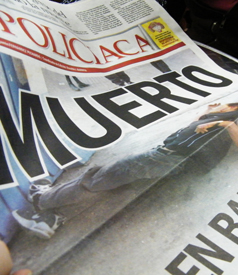Mexico City – Press advocates and newspaper editors say a campaign by criminal syndicates to kill journalists is drawing a dark curtain across swaths of Mexico.
“We aren’t reporting on matters of drug trafficking,” Patricia Mercado, the editor of the Imagen newspaper in Zacatecas, acknowledged bluntly at a forum Thursday that brought together editors from across Mexico. “We’ve been warned that we cannot touch the issue.”
The issue of soaring threats against Mexican journalists came to the fore this week after an anguished front-page plea to drug cartels from a border newspaper and the unprecedented granting of U.S. asylum to a Mexican journalist.
“This is a national crisis,” said Carlos Lauria, senior coordinator for the Americas for the Committee to Protect Journalists, a New York-based advocacy group. “It affects the fundamental rights of Mexicans to be informed.”
Numbers help tell the story. At least 30 Mexican journalists have been killed or have disappeared since President Felipe Calderon came to office in late 2006, but that’s resulted in only a handful of arrests, according to the committee.
In the most recent case, an armed hit squad approached a gray sedan in a mall parking lot Sept. 16 in Ciudad Juarez, a border city that’s Mexico’s murder capital, and shot two photographers for Diario de Juarez, killing one of them, Luis Carlos Santiago, 21.
The murder led Diario de Juarez to publish a dramatic front-page plea that some understood as yielding to criminal gangs.
“What do you want from us?” the newspaper asked regional drug lords. “You are currently the de facto authorities in this city. . . . Tell us what you expect from us as a newspaper?”
Calderon received a joint delegation of editors and press advocates from around the hemisphere Wednesday. Afterward, his office announced that it would establish a warning system and plan of protection for journalists, and it reiterated a promise to make attacks on journalists subject to federal investigation.
Click here to get Truthout stories like this one sent straight to your inbox, 365 days a year.
However, skepticism about Calderon’s pledges was thick Thursday among newspaper editors at a forum hosted by the Committee to Protect Journalists and the Inter American Press Association, a hemispheric press affairs group.
Thousands of police officers and soldiers patrol the streets of Ciudad Juarez but they don’t make residents feel safer, said Diario de Juarez director Pedro Torres, because “they have taken part in kidnappings, in extortions and in robberies.”
Several editors said their newspaper installations had been strafed by gunfire or hit by grenade attacks, in addition to constant threats against reporters.
“When we suspect that a journalist is in danger, we simply sacrifice the story and pull them back,” said Javier Garza of the El Siglo de Torreon newspaper in Coahuila state.
When two reporters looked into a drug-related murder recently in Sinaloa state, home to a powerful drug cartel, men at the scene told them, “Publish anything, bastards, and we’ll kill you,” said Ismael Bojorquez, the editor of the Rio Doce weekly newspaper. “The police also said, ‘Don’t publish anything, because he is the son of a heavy weight.’ “
Mexican journalists who fear for their lives increasingly are fleeing to the United States and Canada.
A reporter from Ciudad Juarez, Jorge Luis Aguirre, told McClatchy in a telephone call from El Paso, Texas, that the Obama administration had granted him political asylum this week, the first time a Mexican journalist has won an asylum case.
“It’s a tremendous victory,” said El Paso lawyer Carlos Spector. He represents several Mexican journalists who are seeking U.S. asylum.
Pressure against journalists in northern Mexico “has basically killed local investigative reporting, hard-hitting reporting,” Spector said, adding that the scarcity of in-depth news may undermine Mexican democracy.
“If the Mexican public doesn’t have information, they can’t make decisions,” he said.
One of Spector’s clients, Alejandro Hernandez, was among four journalists who were kidnapped for several days in late July when they looked into a mass murder near Torreon, reportedly carried out when a prison director provided guns and vehicles to inmates and let them out to kill.
Hernandez and the other journalists were released within a few days when two television networks agreed to air videos prepared by drug gangs.
“They beat us and they starved us, but that is nothing compared to losing one’s life,” Hernandez said by telephone.
A cameraman for the huge Televisa network, Hernandez fled to Texas with his wife and two children, and this month put in his U.S. asylum request in Houston.
“I can’t return to Mexico. I’m afraid for my life. They will kill me,” Hernandez said of the narcotics cartels.
We have 9 days to raise $50,000 — we’re counting on your support!
For those who care about justice, liberation and even the very survival of our species, we must remember our power to take action.
We won’t pretend it’s the only thing you can or should do, but one small step is to pitch in to support Truthout — as one of the last remaining truly independent, nonprofit, reader-funded news platforms, your gift will help keep the facts flowing freely.
